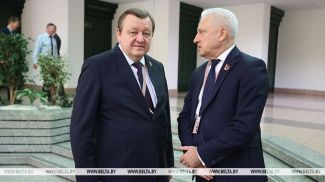MINSK, 15 January (BelTA) – Emotional contagion spreads more rapidly on social media than in crowds and is difficult to track down, Olga Ageiko, the head of the department for humanities at the Academy of Public Administration under the aegis of Belarus' president, said as she took part in another meeting of the Expert Community project “Deepfakes: New Challenge to Information Security” in the BelTA press center on 15 January.
On social media people buy not into plain facts but into emotions, the expert pointed out. “The phenomenon of social media at the moment can be compared to the crowd psychology. Fundamentally, emotional contagion actually happens way more quickly on social media rather than in a crowd, but we fail to notice that.” Emotional contagion is the mechanism of having one person's or group's mood trigger similar emotions and related behaviors in other people in the course of direct interaction, which induces certain mental states in the person.
Olga Ageiko remarked that many people preserve the so-called clip way of perceiving information. Often people do not perceive facts that do not fit in with their personal outlooks on life. “As a result, we grow to become clammed up on other sources of information: we read only the things we want to read, we hear only the things we want to hear, and thus we end up emotionally deaf,” noted the expert. She said social media are some sort of channels for emotional upsurge. Meanwhile, the probability of emotional contagion on social media is so high that, as the expert believes, “this process might not be under our full control.”
Deepfakes are a synthetic media technology in which a person in an existing image or video is replaced with someone else's likeness using artificial neural networks and artificial intelligence. The most prominent example of how artificial intelligence can facilitate the creation of a photorealistic fake video is the video showing Barack Obama slamming today's U.S. President Donald Trump. The video was released in April 2018 on the BuzzFeed platform. At the end of the video its creators said that it was a fake. By releasing this video they sought to bring attention to the dangers of the controversial video-editing technology. The Intelligence Committee of the U.S. Congress held the first hearings on deepfake videos in the summer of 2019. The bill on combating high-tech disinformation was introduced to the U.S. parliament. Facebook has recently announced its decision to remove videos modified by artificial intelligence.











